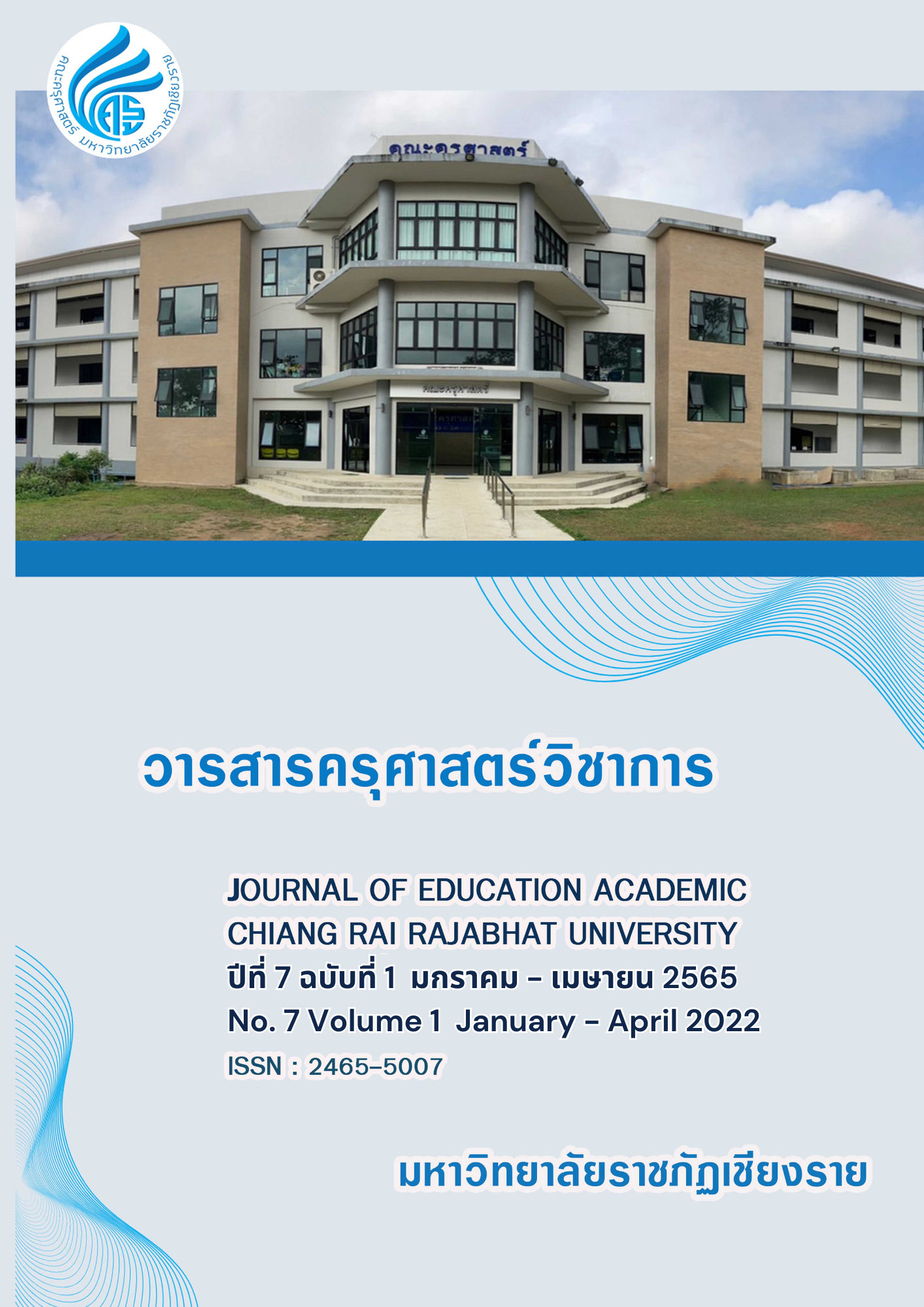The Guidelines for Development of Participatory Administration of Wiangphangkham Municipality School, Mae Sai District, Chiang Rai Province
Keywords:
The Guidelines for Development, Participatory Administration, Wiangphangkham Municipality SchoolAbstract
This aims of this study were (1) to examine the circumstance of participatory administration of Wiangphangkham Municipality School, Mae Sai District, Chiang Rai Province; (2) to investigate promoting and de-promoting factors affecting participatory administration of Wiangphangkham Municipality School; and (3) to develop the guidelines for development of participatory administration of Wiangphangkham Municipality School. The data sources involved 40 participants which were 1 school administrator, 11 teachers, 20 parents, and 8 school committees. The research instruments were questionnaire, interview, and focus-group discussion. The statistics for data analysis were mean and standard deviation while content analysis was used to develop summary reports by tables and narrative format.
- The participatory administration circumstance of Wiangphangkham Municipality School, Mae Sai District, Chiang Rai Province, in overall, was rated at the moderate level.
- The promoting and de-promoting factors affecting the participatory administration were reported. Personnel: The promoting factors were that school committees, teachers and parents are native residents of the community so they hold strong bonding and shared ownership with the community. The de-promoting factors were that local people are workers with low education so they are unlikely to share participation in education provision. Budget: The promoting factors were that Wiangphangkham Municipality School earns budget support from Wiangphangkham Sub-district Municipality that allows related agencies in
co-planning. The de-promoting factors were that the majority of students’ parents are relatively poor and thus lack participation in offering resources allocation. Materials and equipment: The promoting factors were that the school is located within the community area and the community thus allows the school to use the community area for school activities. The de-promoting factors were inadequacy of instructional materials as instructional materials are the medium for knowledge transmission from teachers to students by means of co-learning management. Management: The promoting factors were that stakeholders co-monitor students’ behavior, while the de-promoting factors were the lack of understanding among related people regarding mobilizing policy into practice and lack of consistent monitoring. - The guidelines for participatory administration of Wiangphangkham Municipality School were proposed. (1) Trust refers to stable and reciprocal trust verbally and physically. The school must learn how to encourage personnel in creating vision in order to consolidate commitment to the school. (2) Commitment for engagement means that school administrators should allow stakeholders to participate in determining policy, objectives and goals. (3) Setting up goals and objectives refers to allowing colleagues to express their ideas for better communication, exchange working experience together, and consolidate good relationships among peers. (4) Independence in responsibility means that everyone should take responsibility for their assigned jobs and they should hold the rights in expressing their ideas together which liberates all related individuals in voicing their thoughts and delivering their best performance on their jobs. Efficiency of freedom is necessary for success due to good monitoring. Also, allowing the community to share their roles in education provision would help mobilize educational management corresponding to the parents’ and community’s needs. This favors acceptance of community towards the school and the community would take good care of the school in return. The community and parents then support resources for education and offer full cooperation in mobilizing school activities successfully.
References
กรมสามัญศึกษา. (2543). การมีส่วนร่วมของชุมชนในการจัดการศึกษาขั้นพื้นฐานระดับมัธยมศึกษา (ตามแนวพระราชบัญญัติการศึกษาแห่งชาติ 2542). กรุงเทพมหานคร: โรงพิมพ์การศาสนา.
ชูชาติ พ่วงสมจิตร์. (2541). การวิเคราะห์ปัจจัยที่ส่งเสริมและปัจจัยที่เป็นอุปสรรค ต่อการมีส่วนร่วมของชุมชนกับโรงเรียนประถมศึกษาในเขตปริมณฑลกรุงเทพมหานคร. (วิทยานิพนธ์ครุศาสตรดุษฎีบัณฑิต). จุฬาลงกรณ์มหาวิทยาลัย. กรุงเทพมหานคร.
ไตรรัตน์ จงจิตร. (2546). การบริหาร-นักบริหาร. กรุงเทพมหานคร: พิมพ์ลักษณ์.
ปรีชา คัมภีรปกรณ์. (2541). เอกสารชุดการสอนชุดวิชาโรงเรียนกับชุมชน ความสัมพันธ์ระหว่างโรงเรียนกับชุมชนในประเทศไทย. นนทบุรี: มหาวิทยาลัยสุโขทัยธรรมธิราช.
วีระพงศ์ เดชบุญ. (2540). ความพร้อมในการมีส่วนร่วมจัดการศึกษาขั้นพื้นฐาน 12 ปี ขององค์การบริหารส่วนตำบล เขตการศึกษา 10. กรุงเทพมหานคร: กระทรวงศึกษาธิการ.
สมลักษณ์ ภูคำแสน. (2540). การศึกษาบทบาทของชุมชนต่อการมีส่วนร่วมในการจัดการศึกษาในโรงเรียนมัธยมศึกษาจังหวัดขอนแก่น. (วิทยานิพนธ์ศึกษาศาสตรมหาบัณฑิต). มหาวิทยาลัยขอนแก่น. ขอนแก่น.
สัมพันธ์ อุปลา. (2541). การศึกษาการมีส่วนร่วมของชุมชนในการจัดการศึกษาในโรงเรียนประถมศึกษาสังกัดสำนักงานการประถมศึกษาจังหวัดอุดรธานี. (วิทยานิพนธ์ศึกษาศาสตรมหาบัณฑิต). มหาวิทยาลัยขอนแก่น. ขอนแก่น.
เสกสิฐ เล้ากิจเจริญ. (2550). การพัฒนารูปแบบการบริหารจัดการเทคโนโลยีคอมพิวเตอร์เพื่อการเรียนการสอนในโรงเรียนคาทอลิกสังกัดสังฆมณฑลราชบุรี เขตเหนือ. (ปริญญานิพนธ์การศึกษามหาบัณฑิต). มหาวิทยาลัยศรีนครินทรวิโรฒประสานมิตร. กรุงเทพมหานคร.
อุทร ก้อนสมบัติ. (2544). การศึกษาการมีส่วนร่วมของผู้ปกครองในการจัดการศึกษาของโรงเรียนมัธยมศึกษา สังกัดสามัญศึกษาจังหวัดน่าน. (วิทยานิพนธ์ครุศาสตรมหาบัณฑิต). สถาบันราชภัฏอุตรดิตถ์. อุตรดิตถ์.
Downloads
Published
Issue
Section
License
Copyright (c) 2022 Journal of Education Academic Chiang Rai Rajabhat University

This work is licensed under a Creative Commons Attribution-NonCommercial-NoDerivatives 4.0 International License.






